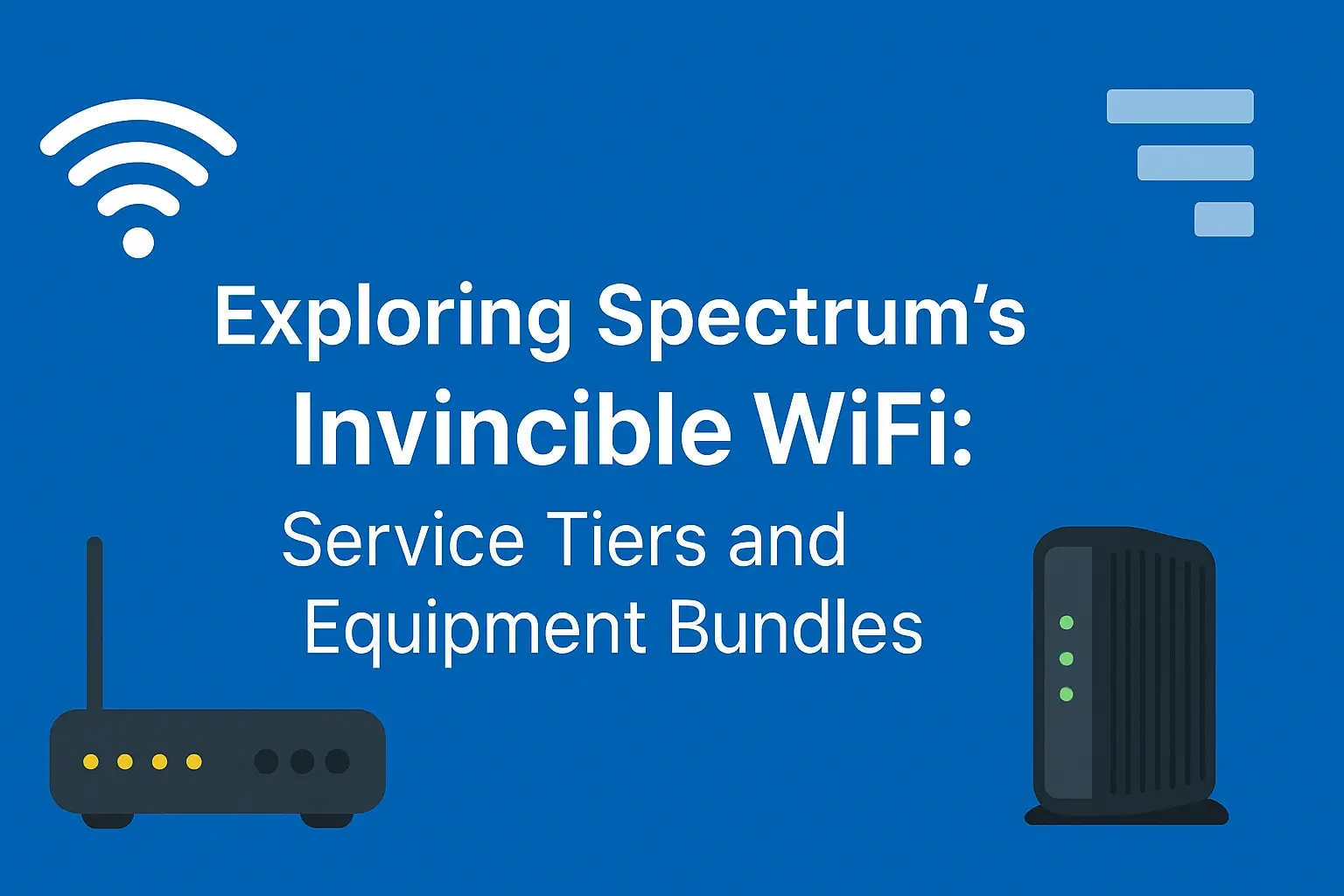How To Lower Spectrum Bill in 2024?

Struggling with a high Spectrum bill in 2025? This comprehensive guide reveals proven strategies and insider tips to significantly reduce your monthly internet and TV expenses. Discover how to negotiate, bundle, and switch to save hundreds annually.
Understanding Your Spectrum Bill
Before you can effectively lower your Spectrum bill, a thorough understanding of its components is crucial. Many customers overlook the details, leading to overpayment for services they don't fully utilize or even need. In 2025, Spectrum's billing structure, like most providers, can be complex, featuring a base service price, equipment rental fees, broadcast TV fees, regional sports fees, and taxes. These add-ons, often presented as small line items, can accumulate significantly over a billing cycle.
Decoding Common Line Items
Let's break down what you're typically paying for:
- Base Service Charge: This is the advertised price for your internet speed tier or TV channel package. However, this is often a promotional price that expires.
- Equipment Rental Fees: Spectrum charges a monthly fee for modems, routers, and cable boxes. Owning your own equipment can be a significant saving.
- Broadcast TV Surcharge: This fee covers the cost of carrying local broadcast channels. It's a recurring charge that many subscribers find frustrating as it's not directly tied to their chosen package.
- Regional Sports Surcharge: If your TV package includes access to regional sports networks, you'll likely see this fee. It can fluctuate based on the number of sports channels in your area.
- Taxes and Government Fees: These are unavoidable but can vary by location.
- One-Time Charges: Installation fees, service call fees, or late payment fees can appear unexpectedly.
Identifying Hidden Costs and Promotional Expirations
The most common reason for a sudden increase in your Spectrum bill is the expiration of a promotional discount. These introductory offers are designed to attract new customers and typically last for 12 or 24 months. Once this period ends, your bill will revert to the standard, higher rate. It's vital to track these expiration dates. You can usually find this information on your past bills or by logging into your Spectrum online account. Additionally, be aware of services you might be paying for but no longer use, such as premium movie channels or specific sports packages.
The Impact of Equipment Choices
Spectrum's equipment rental fees are a consistent drain on your monthly budget. For instance, renting a modem and router can cost upwards of $20-$30 per month. Over a year, this amounts to $240-$360. Many customers are unaware that they can purchase their own compatible equipment and potentially save a substantial amount of money. While there's an upfront cost, the long-term savings can be considerable. Ensure any purchased equipment is on Spectrum's approved list to avoid compatibility issues.
Gathering Your Billing Information
To prepare for negotiation or plan changes, have your most recent Spectrum bill readily available. Note down the exact services you are subscribed to, the current monthly cost, and any promotional discounts that are active or have recently expired. Understanding your usage patterns is also helpful. For example, if you rarely watch live TV and primarily stream content, you might be overpaying for a comprehensive cable package. Similarly, if your internet speeds are consistently much higher than what you actually need for your household's online activities, there might be a more cost-effective tier available.
Mastering Spectrum Bill Negotiation
Negotiating with Spectrum can feel daunting, but with the right approach, you can achieve significant savings. The key is to be prepared, polite, and persistent. Remember, customer retention is a priority for service providers, and they often have flexibility in their pricing to keep you as a customer.
When to Negotiate
The best times to negotiate are:
- Before your promotional period ends: Proactively contact Spectrum a month or two before your current discount expires to see if they can offer a new promotion.
- When you receive a bill increase: If your bill has suddenly gone up due to a promotion ending, call immediately to discuss options.
- When you're considering switching providers: Mentioning that you've received competitive offers from other companies can be a strong negotiating tactic.
- After a service issue: If you've experienced significant service disruptions, you might have leverage to ask for a bill credit or a discount.
Preparing for the Call
Before you dial Spectrum's customer service number, gather the following:
- Your account number and personal information for verification.
- Your most recent bill, highlighting the current charges and any expiring promotions.
- A list of the services you currently have and your desired services.
- Information on competitor pricing in your area (this is crucial leverage).
Step-by-Step Negotiation Guide
- Call Spectrum Customer Service: Dial the appropriate number (often found on your bill or their website).
- Be Polite and Patient: Start the conversation with a friendly tone. Explain that you've been a loyal customer and are concerned about your current bill.
- State Your Goal Clearly: "I'm calling today because my bill has increased significantly due to an expiring promotion, and I'm looking for ways to reduce my monthly expenses. I'm hoping you can help me find a more affordable package."
- Highlight Competitor Offers: "I've noticed that [Competitor Name] is offering similar internet speeds for [Price] per month in my area. I'd prefer to stay with Spectrum, but I need my bill to be competitive."
- Ask for Promotions: "Are there any current promotions or discounts available for existing customers that I might be eligible for?"
- Inquire About Plan Adjustments: "Could you review my current plan? I might not be using all the channels in my TV package, and I'm open to downgrading to a more cost-effective option if it significantly reduces my bill."
- Negotiate Equipment Fees: "I'm also paying a significant amount for equipment rental. Are there any ways to reduce this, perhaps by purchasing my own compatible equipment?"
- Escalate if Necessary: If the initial representative cannot offer a satisfactory solution, politely ask to speak with a supervisor or a retention specialist. These individuals often have more authority to offer discounts.
- Confirm Everything: Once you agree on a new price or package, ask for a confirmation number and a summary of the changes in writing (via email or updated online account).
Leveraging Competitor Pricing
Researching competitor offers is arguably the most powerful negotiation tool. Websites like BroadbandNow, HighSpeedInternet.com, and even direct competitor sites can provide pricing information for internet and TV services in your specific zip code. When you call Spectrum, you can state, "I'm currently paying $X for my Spectrum service, but I've seen offers from [Competitor A] for $Y and [Competitor B] for $Z for comparable services. I'd like to see if Spectrum can match or beat these prices." This puts Spectrum in a position to either retain your business with a better offer or risk losing you.
The Power of the "Cancel" Threat (Used Wisely)
While not always necessary, expressing your genuine intent to cancel can sometimes prompt a better offer. Frame it as a last resort: "If we can't find a solution to bring my bill down to a more manageable level, I will unfortunately have to explore other options." A retention specialist's primary goal is to prevent cancellations, so they may be empowered to offer deeper discounts or more attractive packages than a standard customer service representative.
Smart Bundling and Unbundling Strategies
Spectrum offers a variety of bundles that combine internet, TV, and sometimes phone services. While bundling can offer convenience and perceived savings, it's not always the most cost-effective strategy for every household. Understanding when to bundle and when to unbundle is key to optimizing your bill.
The Pros and Cons of Bundling
Pros:
- Convenience: One bill for multiple services.
- Potential Savings: Often advertised as a way to save money compared to purchasing services individually.
- Simplified Management: Easier to manage a single account.
Cons:
- Paying for Unused Services: Bundles may include channels or internet speeds you don't need.
- Less Flexibility: Harder to customize individual service components.
- Promotional Pitfalls: Bundled discounts often expire, leading to significant price hikes.
When Bundling Makes Sense
Bundling is generally beneficial if:
- You genuinely use all the services included in the bundle (e.g., you need high-speed internet, a comprehensive TV package, and a home phone line).
- The bundled price is significantly lower than the sum of individual services from Spectrum or other providers.
- You can secure a long-term promotional bundle that fits your budget.
For example, a family that watches a lot of live sports and uses high-speed internet for multiple devices might find a triple-play bundle (internet, TV, phone) to be a good value, especially if it includes a significant introductory discount. However, it's crucial to compare the bundled price against the cost of individual services from Spectrum and other providers to ensure it's truly the best deal.
The Power of Unbundling
Unbundling involves separating your services. This is often the most effective strategy for reducing your Spectrum bill, especially if you:
- Don't need a landline: Most households have moved to mobile phones, making a landline redundant.
- Primarily stream content: If you use services like Netflix, Hulu, or YouTube TV, a traditional cable TV package might be overkill.
- Only need basic internet: If your online activities are limited to browsing, email, and occasional streaming, you might not need the fastest internet speeds.
- Want to mix and match providers: You might find better deals for internet from one provider and streaming services from another.
Example: Instead of a $150/month triple-play bundle, you could opt for Spectrum's 300 Mbps internet for $65/month (after negotiation), use a streaming service like YouTube TV for $73/month, and forgo the landline. This brings your total to $138/month, potentially saving you money and giving you more flexibility. If you can negotiate the internet down further, the savings increase.
Strategies for Unbundling Effectively
- Assess Your Needs: Honestly evaluate how you use internet, TV, and phone services.
- Research Individual Service Costs: Check Spectrum's website for the standalone prices of the services you want.
- Explore Streaming Alternatives: Look into live TV streaming services (Sling TV, Hulu + Live TV, YouTube TV, FuboTV) and on-demand streaming platforms.
- Consider Your Own Equipment: As mentioned earlier, purchasing your own modem and router can eliminate rental fees.
- Contact Spectrum to Unbundle: Call customer service and explain that you wish to remove certain services from your bundle. Be prepared to negotiate the price of the remaining services.
Comparison: Bundled vs. Unbundled (Illustrative 2025 Pricing)
This table provides a hypothetical comparison. Actual prices will vary by location and available promotions.
| Service | Spectrum Bundle (Hypothetical) | Unbundled Services (Hypothetical) |
|---|---|---|
| Internet (300 Mbps) | Included in bundle | $75/month (Standard Price) |
| TV (Select Channels) | Included in bundle | $50/month (Basic Cable) |
| Phone | Included in bundle | $30/month (Standalone Landline) |
| Total Bundle Price (Promotional) | $120/month (First 12 months) | N/A |
| Total Bundle Price (Standard) | $180/month (After promotion) | N/A |
| Total Unbundled Price (Negotiated Internet + Basic TV) | N/A | $105/month (e.g., $65 for Internet + $40 for TV) |
| Savings by Unbundling | N/A | $15/month (or $75/month after promo) |
Note: This table assumes you've negotiated the internet price down. The savings can be even greater if you eliminate cable TV entirely and rely on streaming.
Exploring Spectrum Alternatives
If negotiation and bundling strategies don't yield the savings you desire, or if you're simply looking for better service or pricing, exploring alternatives is essential. The landscape of internet and TV providers is constantly evolving, offering more choices than ever before.
Internet Alternatives
Spectrum primarily uses cable infrastructure. Depending on your location, you may have access to other types of internet service:
- Fiber Optic Internet: Providers like Verizon Fios, AT&T Fiber, and Google Fiber offer fiber optic connections, which are generally faster, more reliable, and offer symmetrical upload/download speeds. These can be excellent alternatives if available.
- DSL Internet: Offered by traditional phone companies (like AT&T, CenturyLink), DSL uses phone lines. It's typically slower than cable or fiber but can be a more affordable option in some areas.
- 5G Home Internet: Major carriers like T-Mobile and Verizon are increasingly offering 5G home internet services. These can be a strong contender, especially in areas where traditional broadband options are limited or expensive. They often come with unlimited data and competitive pricing.
- Satellite Internet: Services like HughesNet and Viasat are options for rural areas where other broadband is unavailable. However, they are generally slower, have data caps, and can be more expensive.
2025 Market Trends: The expansion of 5G home internet and fiber optic networks continues to increase competition. Many 5G home internet plans offer fixed pricing for extended periods, making them attractive alternatives to cable providers whose prices often increase after initial promotions.
TV Alternatives
The shift towards streaming has made traditional cable packages less appealing for many. Consider these alternatives:
- Live TV Streaming Services: These services mimic traditional cable by offering live channels, often including local networks, sports, and news. Popular options include:
- YouTube TV: Offers a comprehensive channel lineup, including local networks, and unlimited cloud DVR.
- Hulu + Live TV: Combines live TV with Hulu's on-demand library and Disney+.
- Sling TV: A more customizable option with different "Orange" and "Blue" packages, allowing you to build a package that suits your needs and budget.
- FuboTV: Focuses heavily on sports but also offers a wide range of entertainment channels.
- On-Demand Streaming Services: For those who don't need live TV, services like Netflix, Amazon Prime Video, Max, Disney+, and Apple TV+ offer vast libraries of movies and TV shows for a monthly subscription.
- Over-the-Air (OTA) Antennas: A digital antenna can pick up local broadcast channels (ABC, CBS, NBC, FOX, PBS) for free. This is an excellent supplement to streaming services, especially for news and major sporting events.
2025 Market Trends: Cord-cutting continues to accelerate. Live TV streaming services are becoming more robust, offering competitive channel lineups and features. The pricing of these services is also becoming more stable compared to cable, with fewer hidden fees.
How to Switch
- Research Availability: Use online tools or call providers to check which services are available at your address.
- Compare Pricing and Plans: Look at the total monthly cost, including any installation fees, equipment charges, and taxes. Pay close attention to promotional periods and standard rates.
- Read Reviews: Check customer reviews for reliability, customer service, and overall satisfaction.
- Understand Contracts: Be aware of any contract lengths and early termination fees. Many streaming services and some internet providers offer month-to-month plans.
- Schedule Installation/Activation: Once you've chosen a new provider, schedule an installation or activation date.
- Cancel Spectrum: After your new service is active and working correctly, contact Spectrum to cancel your old service. Be sure to return any rented equipment to avoid further charges.
Example: Switching from Spectrum Bundle to Streaming
Current Spectrum Bundle: $180/month (Internet, TV, Phone - standard rate)
Alternative:
- Internet Provider (e.g., AT&T Fiber): $70/month (for 500 Mbps, negotiated)
- YouTube TV: $73/month
- Mobile Phone: $50/month (for a single line plan)
- Total Monthly Cost: $193/month
While this example shows a slight increase, consider that the fiber internet is likely faster and more reliable than Spectrum's cable, and YouTube TV offers a more modern TV experience. If you can negotiate Spectrum's internet down to $65 and use Sling TV at $40/month, the total would be $155/month, a significant saving.
Optimizing Your Current Spectrum Plan
Before considering a complete switch, ensure you're getting the most out of your existing Spectrum services. Small adjustments can lead to noticeable savings without the hassle of changing providers.
Reviewing Your Internet Speed Needs
Spectrum offers various internet speed tiers. Do you truly need gigabit speeds if you only have one or two devices and primarily use the internet for email and browsing? Conversely, if you have a large household with multiple users streaming, gaming, and working from home, you might be experiencing slowdowns because your current plan is insufficient, leading you to believe you need a more expensive plan when you simply need the *right* plan.
- Single User/Light Use: 100-200 Mbps might be sufficient.
- Small Household/Moderate Use: 200-400 Mbps is often adequate.
- Large Household/Heavy Use: 400 Mbps to 1 Gbps may be necessary.
You can test your current internet speed using sites like Speedtest.net. If your speeds consistently fall short of what you're paying for, you have grounds to discuss this with Spectrum, potentially leading to a discount or a plan upgrade to a tier that actually performs better.
Evaluating Your TV Package
Many Spectrum customers are subscribed to extensive TV packages that include hundreds of channels they rarely watch. This is a prime area for cost reduction.
- Identify Your Must-Have Channels: Make a list of the channels you watch regularly.
- Compare with Lower Tiers: Check Spectrum's website or your bill for their more basic TV packages. See if your essential channels are included in a cheaper tier.
- Consider "Skinny Bundles": Some providers offer smaller, more focused packages.
- Eliminate Premium Channels: If you subscribe to HBO, Showtime, Starz, etc., and don't watch them frequently, consider canceling them.
Example: If you're paying $150 for a premium TV package but only watch news, basic cable, and a few sports channels, you might be able to downgrade to a $60-$80 package and use the savings for a targeted streaming service for specific shows or movies.
The "Own Your Equipment" Strategy Revisited
As mentioned earlier, this is a critical optimization. Spectrum's modem and router rental fees can add up to over $300 per year. Purchasing your own compatible equipment is a one-time investment that pays for itself within months.
Steps to Own Your Equipment:
- Check Spectrum's Approved Equipment List: Visit Spectrum's website or contact customer support to get a list of compatible modems and routers.
- Purchase Compatible Equipment: Buy a modem and/or router from a reputable retailer (e.g., Amazon, Best Buy). Ensure the modem is DOCSIS 3.0 or 3.1 for optimal performance.
- Activate Your Equipment: Once you have your equipment, contact Spectrum to activate it on your account. You'll need the MAC address of the device.
- Return Rented Equipment: Take your Spectrum-rented equipment to a local Spectrum store or arrange for a return shipment to stop incurring rental fees.
Estimated Savings: If you save $25 per month on equipment rental, that's $300 per year. A good quality modem and router can be purchased for $150-$250, meaning you'll recoup your investment in under a year.
Bundling Services You Actually Use
If you've unbundled and found that you miss the convenience or perceived savings of a bundle, it might be time to re-evaluate. However, this time, ensure the bundle truly aligns with your usage. For instance, if you need high-speed internet and basic TV, look for a double-play bundle that specifically offers these. Don't be swayed by bundles that include a phone line you don't need.
Leveraging Loyalty Programs and Discounts
While Spectrum isn't as aggressive with loyalty programs as some other industries, it's always worth asking if there are any discounts available for long-term customers or specific affiliations (e.g., military, student, employer discounts if applicable). Sometimes, these are not advertised and must be inquired about directly.
Additional Money-Saving Tips
Beyond the core strategies of negotiation, bundling, and exploring alternatives, several other tips can help you trim your Spectrum bill and overall household expenses.
Avoid Unnecessary Add-ons
Be vigilant about services you might have added over time and no longer use. This can include:
- Premium movie channels (HBO, Cinemax, etc.)
- Sports packages (if you don't watch sports)
- International calling plans (if you primarily use mobile or VoIP)
- On-demand movie rentals
Regularly review your bill for these items and cancel anything that doesn't add significant value to your life.
Pay Your Bill on Time to Avoid Fees
Late payment fees can add unexpected costs to your bill. Set up automatic payments or reminders to ensure you never miss a due date. While not a direct reduction in service cost, avoiding these fees is a simple way to save money.
Understand Your Contract Terms
If you are under contract with Spectrum, be aware of the terms and any early termination fees (ETFs). While negotiating is still possible, switching providers before your contract ends might incur penalties. Make sure you factor this into your decision-making process.
Consider a Spectrum Mobile Plan
Spectrum offers mobile phone plans that can be bundled with their internet service. If you're already a Spectrum internet customer, you may be eligible for discounts on their mobile plans. They often use Verizon's network, which provides broad coverage. This can be a good option if you're looking to consolidate your bills and potentially save money on your mobile service, especially if you have multiple lines.
Example: A customer with Spectrum internet and two mobile lines might receive a discount on their internet bill, effectively lowering their overall monthly expenditure.
Review Your Usage Regularly
Set a reminder for yourself every 6-12 months to review your Spectrum bill and your service usage. Needs change, promotions expire, and new offers become available. Proactive review is the best defense against an ever-increasing bill.
The Role of Government Assistance Programs
For eligible low-income households, government programs like the Affordable Connectivity Program (ACP) can provide significant discounts on internet service. While the ACP's future funding has been uncertain, it's worth checking current eligibility requirements and benefits. Spectrum participates in these programs, so if you qualify, it could substantially reduce your internet bill.
Be Aware of Price Increases
Even with optimized plans, service providers like Spectrum periodically implement price increases. By staying informed and prepared to renegotiate or explore alternatives when these increases occur, you can mitigate their impact.
Conclusion
Managing your Spectrum bill in 2025 requires a proactive and informed approach. By thoroughly understanding your current bill, mastering negotiation tactics, strategically bundling or unbundling services, and exploring viable alternatives, you can significantly reduce your monthly expenses. Don't let your bills creep up unnoticed; take control of your service costs by implementing these proven strategies. Whether it's negotiating a better rate, switching to a more cost-effective TV solution, or investing in your own equipment, empowered consumers can achieve substantial savings and ensure they are only paying for the services they truly need and value. Start by reviewing your latest bill and taking the first step towards a more affordable Spectrum experience.





